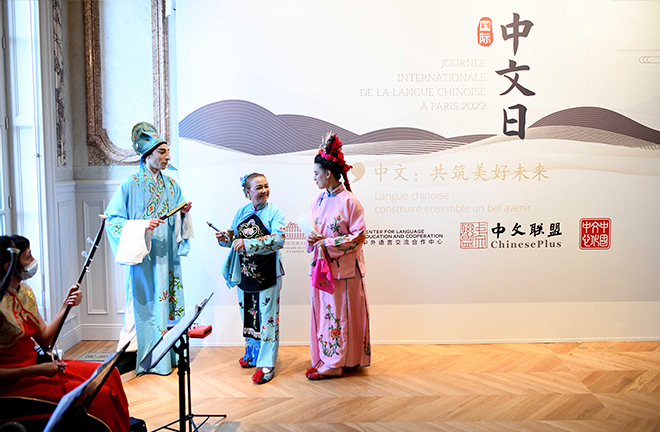Chinese language has great potential as international service

Chinese language lovers in France performing traditional Chinese opera on the “2022 International Chinese Language Day” that took place in Paris. Photo: Li Yang/CNSphoto
By the end of 2021, 76 countries around the world had incorporated Chinese into their national education systems, more than 25 million people were learning Chinese language abroad, and the complete number of people who studied and used Chinese language reached nearly 200 million in totality, according to Ministry of Education in China. With this in mind, the international service of Chinese language has great potential which can build platforms for knowledge and experience communication regarding global development.
Fostering economic development
The “international service of Chinese language” refers to the services provided to meet the international community’s various needs, including education and training, cultivating talent, establishing media, offering translation tools, and organizing cultural exchange programs that are related to the Chinese language. These services should pay special attention to emerging markets and developing countries as one of the main targets. Economies in emerging markets and developing countries account for about half of the global economy and are playing a bigger role in different global development sectors.
Today, China remains one of the most dynamic economies in the world. Take the “Belt and Road” initiative (B&R) as an example. According to statistics from the Ministry of Commerce in China, the trade volume of goods between China and countries along the B&R route reached $11.6 trillion in 2021. China’s direct investment in countries along the B&R route amounted to $138.45 billion in the same year, which involved road construction, municipal engineering, agri-industrial parks, and other sectors. Direct investment in China by companies from countries along the B&R route exceeded $10 billion for the first time, reaching $11.25 billion. The huge volume of trade and investment between China and other countries around the world has created a large number of jobs and stimulated global economic development. In particular, many large-scale overseas projects launched by China-funded enterprises require a large quantity of localized technology, management personnel, and service personnel. The international service of Chinese language can thus take an initiative in meeting these language needs and offering “order-based” services such as “Chinese Language + Vocational Courses.” In this way, the overseas demand for talent proficient in Chinese can be satisfied in such sectors as high-speed rail, economy and trade, tourism, agriculture, and medical treatment. For example, the Confucius Institute of University of Agriculture, Faisalabad in Pakistan offers a course on “Chinese Language + Welding Technology” to meet the enterprises’ demand for welding technicians.
Carrier of cultural exchanges
Language is not only a carrier for culture, but also an essential form of cultural expression. Therefore, providing the international service of Chinese language is also a way of conducting cultural exchanges and mutual learning among different civilizations. Through these language services, Chinese culture not only takes root in overseas Chinese communities, but can also cater to the tastes of many countries around the world in an acceptable way.
For example, since 2002, the “Chinese Bridge” series of Chinese language contests have attracted more than 1.5 million foreign students from more than 160 countries around the world, which builds a bridge of communication between the minds of young people from China and those from the rest of the world.
In addition, the Overseas Chinese Affairs Office of the State Council launched a branded project called the “Paradise of Chinese Culture,” which dispatches a large number of professional teachers to “go global” and teach Chinese culture every year. This project has generally been well-received by local societies.
Hu Jiangang is deputy director of the Institute of Chinese Language Education at Huaqiao University.
Edited by BAI LE
